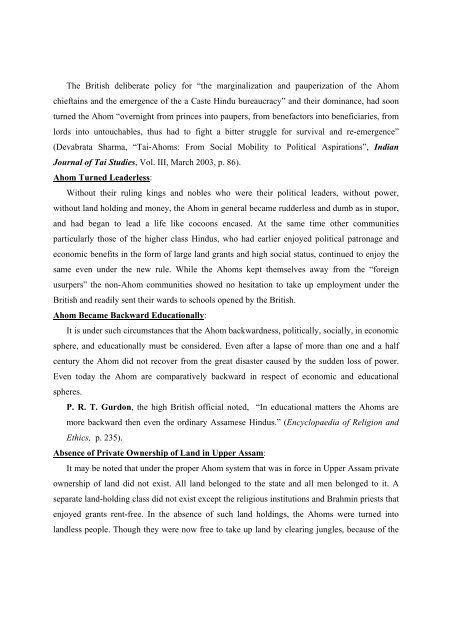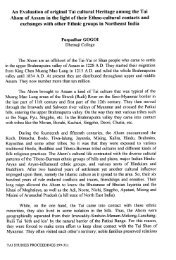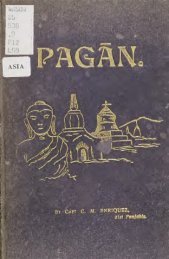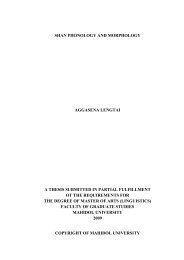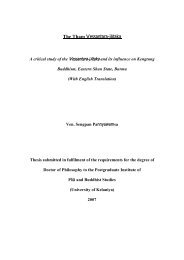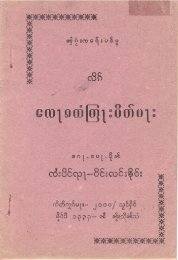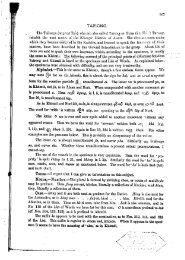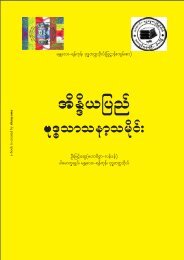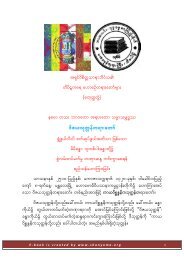The Tai Ahom National Council Memo Scheduling
The Tai Ahom National Council Memo Scheduling
The Tai Ahom National Council Memo Scheduling
You also want an ePaper? Increase the reach of your titles
YUMPU automatically turns print PDFs into web optimized ePapers that Google loves.
<strong>The</strong> British deliberate policy for “the marginalization and pauperization of the <strong>Ahom</strong><br />
chieftains and the emergence of the a Caste Hindu bureaucracy” and their dominance, had soon<br />
turned the <strong>Ahom</strong> “overnight from princes into paupers, from benefactors into beneficiaries, from<br />
lords into untouchables, thus had to fight a bitter struggle for survival and re-emergence”<br />
(Devabrata Sharma, “<strong>Tai</strong>-<strong>Ahom</strong>s: From Social Mobility to Political Aspirations”, Indian<br />
Journal of <strong>Tai</strong> Studies, Vol. III, March 2003, p. 86).<br />
<strong>Ahom</strong> Turned Leaderless:<br />
Without their ruling kings and nobles who were their political leaders, without power,<br />
without land holding and money, the <strong>Ahom</strong> in general became rudderless and dumb as in stupor,<br />
and had began to lead a life like cocoons encased. At the same time other communities<br />
particularly those of the higher class Hindus, who had earlier enjoyed political patronage and<br />
economic benefits in the form of large land grants and high social status, continued to enjoy the<br />
same even under the new rule. While the <strong>Ahom</strong>s kept themselves away from the “foreign<br />
usurpers” the non-<strong>Ahom</strong> communities showed no hesitation to take up employment under the<br />
British and readily sent their wards to schools opened by the British.<br />
<strong>Ahom</strong> Became Backward Educationally:<br />
It is under such circumstances that the <strong>Ahom</strong> backwardness, politically, socially, in economic<br />
sphere, and educationally must be considered. Even after a lapse of more than one and a half<br />
century the <strong>Ahom</strong> did not recover from the great disaster caused by the sudden loss of power.<br />
Even today the <strong>Ahom</strong> are comparatively backward in respect of economic and educational<br />
spheres.<br />
P. R. T. Gurdon, the high British official noted, “In educational matters the <strong>Ahom</strong>s are<br />
more backward then even the ordinary Assamese Hindus.” (Encyclopaedia of Religion and<br />
Ethics, p. 235).<br />
Absence of Private Ownership of Land in Upper Assam:<br />
It may be noted that under the proper <strong>Ahom</strong> system that was in force in Upper Assam private<br />
ownership of land did not exist. All land belonged to the state and all men belonged to it. A<br />
separate land-holding class did not exist except the religious institutions and Brahmin priests that<br />
enjoyed grants rent-free. In the absence of such land holdings, the <strong>Ahom</strong>s were turned into<br />
landless people. Though they were now free to take up land by clearing jungles, because of the


